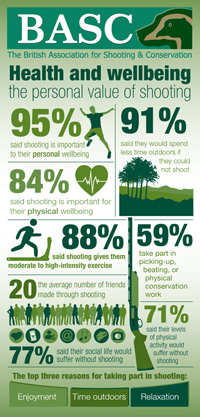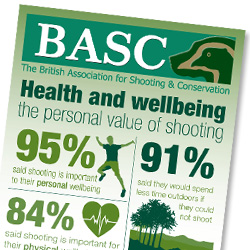
Shooting plays an important part in improving social and personal wellbeing; bringing people together, keeping them active and helping them to spend more time outdoors in the countryside.
New research from the British Association for Shooting and Conservation (BASC), which surveyed 1,400 people, found that 95% said shooting is important to their personal wellbeing and 84% said it helps their physical wellbeing. On average each person makes 20 friends through shooting.
91% said they would spend less time outdoors if they could not shoot. 88% said shooting gives them moderate to intense physical activity. 71% said their levels of physical activity would be reduced without their shooting activities.
The top three reasons for taking part in shooting were spending time outdoors, enjoyment and relaxation. 77% of people said their social life would suffer without shooting. The findings have been highlighted in an infographic published by BASC.
BASC chairman Alan Jarrett said: “Shooting brings people outdoors, gives them exercise and involves them in an active social life. These are all important factors in improving social and personal wellbeing which is a leading indicator of our success as a country.
“Shooting is about much, much more than firing a shot. That moment is the result of physical effort, applied knowledge and social cooperation. People work year-round to manage land and improve habitats. They work to understand their quarry and its environment. They work together and they benefit from it.”
BASC chief executive Richard Ali said: “This research helps us to demonstrate the true value of shooting. It is an important part of life in England, Scotland, Wales and Northern Ireland. It has proven and recognised benefits for the economy, for the countryside and for people.
“We will feed this research into the National Wellbeing Programme. It complements independent research published in 2014 which shows that shooting generates £2 billion for the economy every year, provides jobs and produces conservation work which would take 16,000 new conservation jobs to replace.”
ENDS
[download id=”976″ format=”3″]
